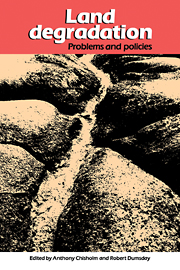Book contents
- Frontmatter
- Foreword
- Contents
- The Contributors
- Figures
- Tables
- Glossary
- Preface
- Land degradation and government
- I Physical and biological aspects of land degradation
- II Social costs
- III Legal, institutional and sociological factors
- IV Behavioural causes, economic issues and policy instruments
- 10 Land degradation: behavioural causes
- 11 An economic perspective on government intervention in land degradation
- 12 Abatement of land degradation: regulations vs economic incentives
- V Pressure groups, public agencies and policy formulation
- VI Towards more effective policies for controlling land degradation: an overview
- A Rational approaches to environmental issues by Anthony Chisholm
- B Comments by Bruce Davidson
- C Comments by John Thomas
- D Participants at workshop on land degradation and public policy
- Bibliography
- Index
10 - Land degradation: behavioural causes
Published online by Cambridge University Press: 05 February 2012
- Frontmatter
- Foreword
- Contents
- The Contributors
- Figures
- Tables
- Glossary
- Preface
- Land degradation and government
- I Physical and biological aspects of land degradation
- II Social costs
- III Legal, institutional and sociological factors
- IV Behavioural causes, economic issues and policy instruments
- 10 Land degradation: behavioural causes
- 11 An economic perspective on government intervention in land degradation
- 12 Abatement of land degradation: regulations vs economic incentives
- V Pressure groups, public agencies and policy formulation
- VI Towards more effective policies for controlling land degradation: an overview
- A Rational approaches to environmental issues by Anthony Chisholm
- B Comments by Bruce Davidson
- C Comments by John Thomas
- D Participants at workshop on land degradation and public policy
- Bibliography
- Index
Summary
Introduction
Land degradation is essentially the result of human action. Irrigation in unsuitable areas may lead to rising water tables and salinisation, overgrazing and unsuitable cultivation practices promote erosion and excessive tree clearance leads to a variety of ills including dryland salting and dieback problems. While in some cases these outcomes are similar in kind to natural processes (eg erosion) the timescale is usually shortened dramatically. These natural processes have largely determined our existing environment, but they rarely constitute a perceived problem unless they have been accelerated or aggravated by human action.
This fundamental fact has not been adequately incorporated into policy discussion surrounding land degradation. The role of agricultural practices in promoting or arresting land degradation has certainly been recognised. However, this has usually occasioned calls for repentance rather than analysis of why farmers make the decisions they do. In policy analysis, more attention has been paid to treating the symptoms of degradation through ameliorative works, rather than dealing with its causes. Ameliorative works may sometimes be the best response to land degradation problems, but they are likely to be ineffectual, or even counterproductive, if they are introduced without taking account of the underlying behavioural causes of the problem.
In this paper, some of the factors which lead farmers to make decisions tending to promote or restrain land degradation will be discussed. This discussion will, in turn, be used as the basis for a brief discussion of the policy options open to governments. Emphasis will be on economic aspects of the farm management decision.
- Type
- Chapter
- Information
- Land DegradationProblems and Policies, pp. 203 - 212Publisher: Cambridge University PressPrint publication year: 1988



